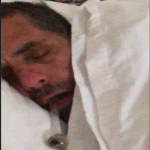Like so many problems that people have, and not only in the addictions area, the main barrier to getting help is denial. Every now and then someone posts about a loved one who has Obstructive Sleep Apnea, but does not take it seriously. Or the post is from someone who has Obstructive Sleep Apnea whose but whose partner does not take it seriously.
So here is how to do a classic intervention, which, once learned, can be adapted to your needs.
It used to be that caring friends and family had to hope that some life event would cause enough pain for the person who was in denial that they would then seek help. Then, about the 1970's, the Johnson Institute in Minneapolis started to develop the techniques of Family Intervention. Which, in a nutshell, sought to bring about enough emotional pain, coming from real-life events, to the person in denial to get them to see, and admit, to the reality that others could see. Or at least get them to agree to comply with the purpose of the intervention. i.e. use an oximeter overnight, go for a sleep test, use a cpap machine etc.
You learn how to do an Intervention, you then try to get close family members, work colleagues or friends involved, and preferably get tutored by an Intervention Specialist. Decide what is the desired outcome and be committed to what the consequences of continued denial will be. Then get the Intervention team together with the one in denial (by hook or crook), and go for it. Make sure you are able to follow through with any consequences should the person stick to their denial, and that you have the support to do that.
The intervention can produce a definite change in the person, so they are willing to get help. Or it may produce compliance to getting help, which may then produce a genuine change. Or it may not work at all.
The following is from a leaflet by Families Anonymous -
More detail is at -What is denial?
Denial is psychological mechanism or process by which human beings protect themselves from something threatening to them by blocking knowledge of that thing from their awareness. Various examples of denial are
1. Simple denial - maintaining that something is not so which is in fact so.
2. Minimizing - admitting to some degree of a problem with chemical usage, but is such a way that it appears to be much less serious than it actually is.
3. Blaming - denying responsibility for certain behaviour and maintaining that the responsibility lies with someone else.
4. Rationalizing - Offering alibis, excuses, justification, and other explanations for behaviour.
5. Intellectualising - Avoiding emotional personal awareness of problem of chemical dependency by dealing with it on a level of generalization intellectual analysis or theorizing.
6. Diversion - Changing the subject to avoid a topic that is threatening
7. Hostility - Becoming angry and irritable when reference is made about a topic so that the person is going to change the subject or avoid bringing the topic up to you again.
The denial system distorts perception and impairs judgement so that we become self-deluded and incapable of accurate self-awareness.
http://en.wikipedia.org/wiki/Denial
http://www.livestrong.com/article/14731 ... th-denial/
The main resources on denial are at -
http://www.hazelden.org/itemquest/searc ... &kw=denial
Once you have some depth of knowledge about denial, then you can prepare for an Intervention.
The best way would be to be coached by an Intervention Specialist, but if that is not possible then careful study and discussion using the following resources may be just as effective.
http://en.wikipedia.org/wiki/Interventi ... nseling%29
Take careful note of the section "Prior Preparation". This is the key to success, and is why it is best to have a depth of knowledge before undertaking an Intervention.
Your main resource for Intervention materials is at -
http://www.hazelden.org/itemquest/searc ... tervention
To repeat - Intervention is not just about different addictions, it is about denial, and producing enough real emotional pain to break through that denial so that the person can see themselves as others see them, and hopefully take action to get well.
And finally, I suggest you work your way through John Bradshaw On: The Family -
http://www.johnbradshaw.com/bradshawont ... ngdvd.aspx
This is absolutely brilliant, and I unreservedly recommend it. This DVD set is worth its weight in gold.
So there it is Folks. If you diligently work your way through the above, and then carefully prepare for an Intervention, that will, I think, give you the best chance of helping someone who does not want help. I know it looks like a lot of expense and hard work, and it is, but if you care about someone, then the results can make it all worthwhile.
Of course, something might just come out of the blue that will do the trick. We can hope so. But if not, the above is the classic method of dealing with denial by doing an intervention. The method is robust, and all kinds of variations can be used when appropriate. Which is why an in-depth knowledge of denial is necessary, so that imaginative interventions can be created when necessary.
Whilst the resources deal mainly with alcohol and drugs, it does not take much imagination to apply the precepts to other problems that people deny, including obstructive sleep apnea.
The best videos on intervention are "If You Loved Me", "I'll Quit Tomorrow", "The Enablers/The Intervention" and "Francesca, Baby". And on denial there is "There Is No Such Thing As An Elephant", "Denial: The Inside Story" and "Falling Back: The Dry Drunk Syndrome".
Feel free to PM me if you have further questions after checking out the above.
All the above is an introduction to the classic Johnson Institute method of Intervention, and has nothing to do with any other use of the word "intervention".
cheers
Mars











